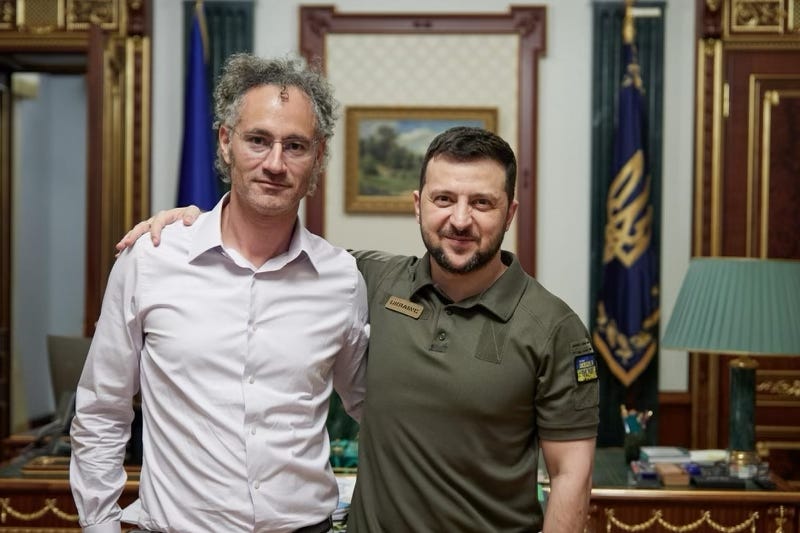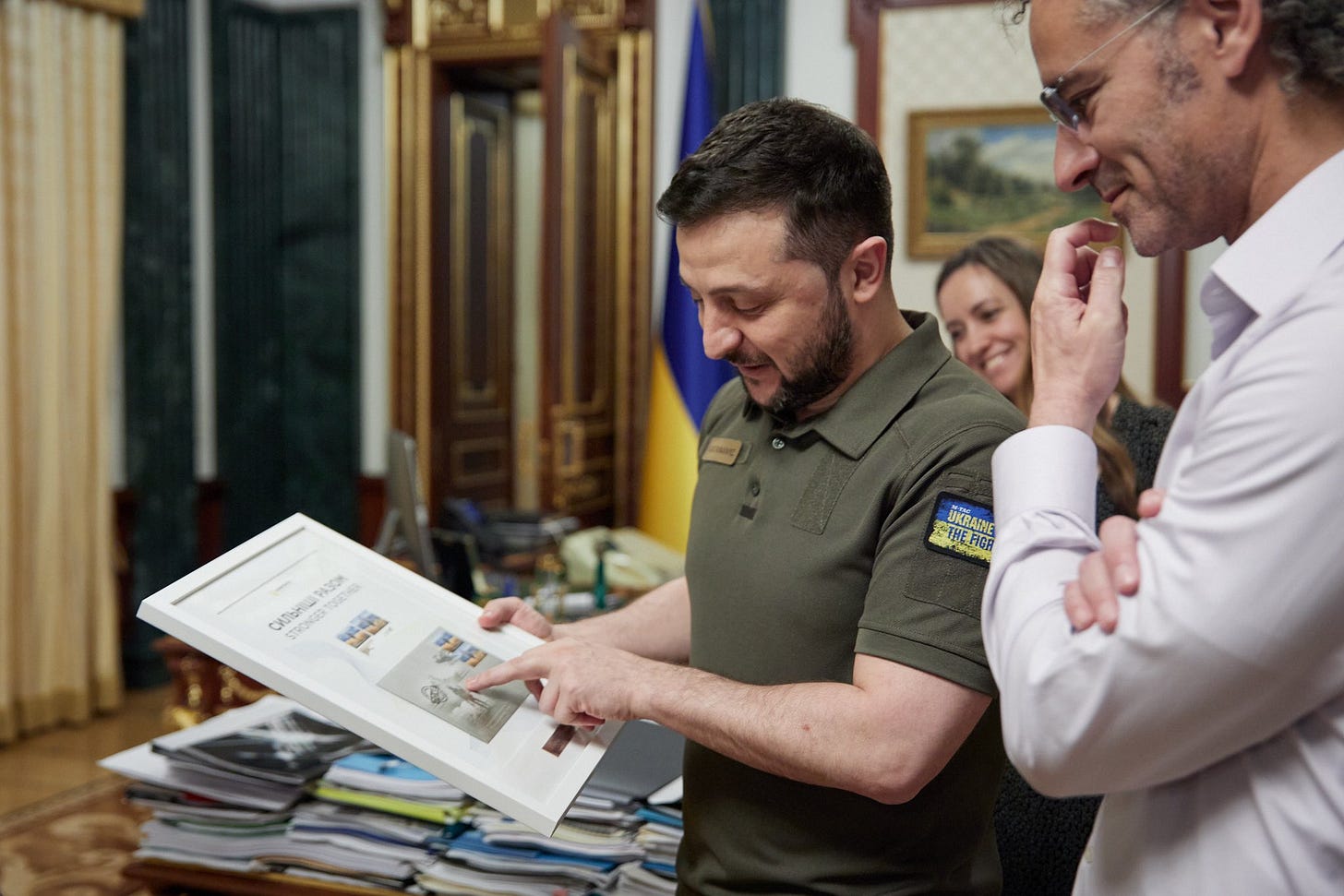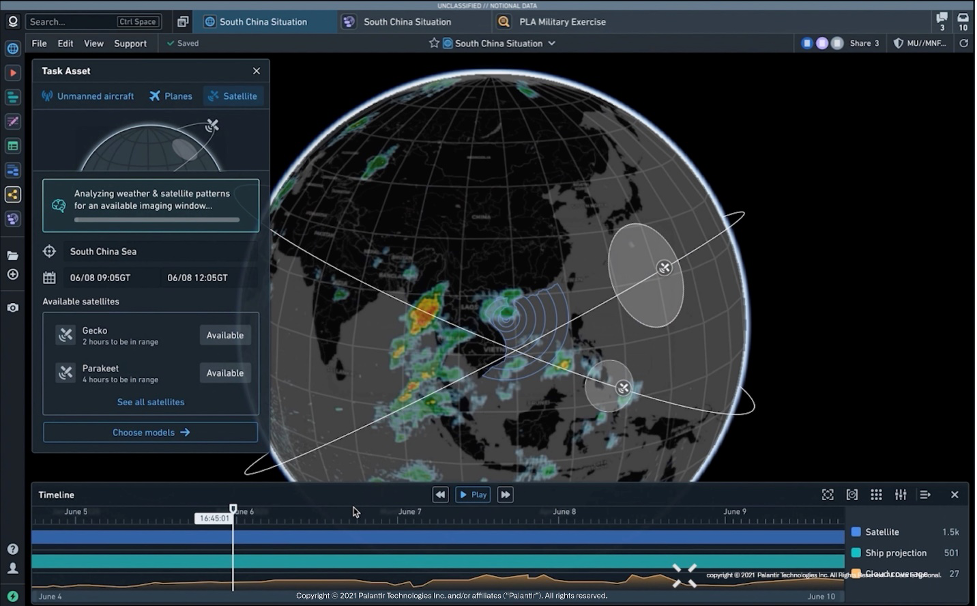Special Guest Edition: Dr. Alex Karp of Palantir Reflects on the Lessons Learned from the War in Ukraine
Hello, I’m Ylli Bajraktari, CEO of the Special Competitive Studies Project. Welcome to our special guest edition of our newsletter, 2-2-2. One year ago, Russia brutally and illegally attacked Ukraine. In the last 12 months since Vladimir Putin launched the attack against Ukraine, we have all witnessed the terrible death and destruction, and the targeting of civilians and infrastructure.
We have also seen technology deployed in unique and innovative ways. This is truly the first networked war, as our Chair Eric Schmidt called it. Many tech companies have played an incredible role in building offensive and defensive capabilities to help Ukrainians during this war.
This morning we released a special edition of our podcast NatSec Tech. Andrey Liscovich, CEO of the Ukraine Defense Fund joined host Jeanne Meserve in conversation on the impact of technology in warfare, the state of day to day life in Ukraine, and what it is like to be on the frontlines.
In today’s special guest edition of our newsletter, we want to highlight the vital role some of America’s tech companies have played in helping Ukraine defend itself against Russian aggression. So I have invited Dr. Alex Karp, the co-founder and CEO of Palantir, to share his thoughts about what he has seen in Ukraine and the critical role that his company has played.
Photo Credit: PaIantir Technologies.
I.
One year into Russia’s unprovoked aggression against Ukraine, one thing is clear: it is the incredible heroism and ingenuity of the Ukrainian people that prevented the collapse of Kyiv, and enabled Ukrainians of all walks of life to continue facing a foe of a far greater size every day. And it is the military acumen and technological sophistication which we have observed from these Ukrainian heroes that enable them to not only find the will to fight Russia, but to beat them back.
In the first days of the war — when the collapse of Ukraine was perceived as imminent — Kyiv looked eerily alone. Today, this could not be further from the truth. The United States, the United Kingdom, NATO, and other global allies and partners answered the call to provide military and political support to our brave Ukrainian allies.
Working with and alongside these state actors and international organizations, the private sector has answered the call to help defend the line of democracy against authoritarianism and territorial revisionism. The United States possesses a significant software advantage, and we are proud to be one of the first companies who have made a serious commitment to support Ukraine in this dark time of war. We will continue to do so in the days of victory that one day lie ahead.
We have learned much in the last year of bitter fighting — how innovative minds and advanced technology, in particular software and artificial intelligence, can be paired in ways that allow David to beat a modern-day Goliath. How our approach to any conflict in the Pacific is being foreshadowed on the eastern plains of Europe. And how private industry has a foundational responsibility to partner with government to defend democratic institutions and the national interest.
Photo Credit: Mykhailo Fedorov, Vice Prime Minister of Ukraine and Minister of Digital Transformation of Ukraine
II.
The deprivations of war are never confined to a battlefield. Destruction and injustice can take many forms that touch an entire society and cross borders. But we have also witnessed the potential for software to make a positive impact on the battlefield and beyond.
We have seen artificial intelligence transformed from coddled experiments in the research lab to resilient models that provide a real advantage on the battlefield. The ingenuity and bravery of the Ukrainian people is now showing the world how advanced technology can be harnessed to provide modern militaries with a new advantage: a decision advantage. The ability to outperform your adversary in terms of the scale and speed with which you can make decisions informed by data is a key part of how Ukrainians are beating back the Russian invaders, who are starved of data and analytically sluggish. One year in, we now see that those with the best trained artificial intelligence models can outmaneuver adversaries who lack them by using data collection, decision-making, and importantly, human action.
With this rise of artificial intelligence that has been tested and proven on the battlefield, we must also reaffirm our commitment to ensuring that such technologies are developed and wielded in ways that maximize their ethical use and protect individual civil liberties. This is why it is so critical that AI policy be developed in partnership with government and non-profit institutions like SCSP, so that every technical advancement made in this war is met with an equal measure of ethical innovation.
Beyond the battlefield, software continues to play its part in supporting Ukraine as a country and as a people. The ability to fight is predicated on the existence of something worth fighting for, and so we must also ensure that the benefits of advanced technology are applied more broadly to societal needs during times of war.
The war in Ukraine has highlighted the urgency with which we must prepare for the next great conflict. As Ukraine’s warriors have unearthed innovation as a key differentiator on the battlefield, then we must waste no time in bolstering our own. China is not Russia. We need to drastically increase our economic and intellectual investment in the functional and ethical use of artificial intelligence and other emerging technologies, and we must reset the American innovation model to meet this need.
This includes the allocation of a significantly larger percentage of the defense budget in the United States to the construction of technology that has been tested on the battlefield, and products that are proven to be transformative and actually work. The world order will be determined by those who win in the end, and who may well possess a very different morality and set of norms from those which we take for granted.
Credit: Palantir MetaConstellation
III.
Palantir was founded on the belief that the United States, its allies, and partners should harness the most advanced technical capabilities for their defense and prosperity. This is why we have firmly stood at Ukraine’s side and will continue to do so. Technology is not and cannot be neutral. It will have a decisive role, and we must leverage our software advantage or pay the price. Public-private partnership is the key to ensuring American security at home and its national interests abroad. This is true today for the war in Europe, and it will be true tomorrow for what may come in the Pacific.
On the anniversary of this unprovoked war, the world remains in awe of Ukraine. Their strength, their bravery, and their innovative talent has inspired us all and revived our purpose as an industry. The rigor with which we have all come to support our Ukrainian partners today will endure, not only to see through an end to this brutal war, but to help build a secure, stable, and prosperous post-war Ukraine for decades to come.
SXSW Meet Up
SCSP and the Gordian Knot Center for National Security Innovation are co-hosting a meetup at SXSW for attendees on March 11th at the Hilton Austin Downtown. Will you be there? Let us know!








all the way up.